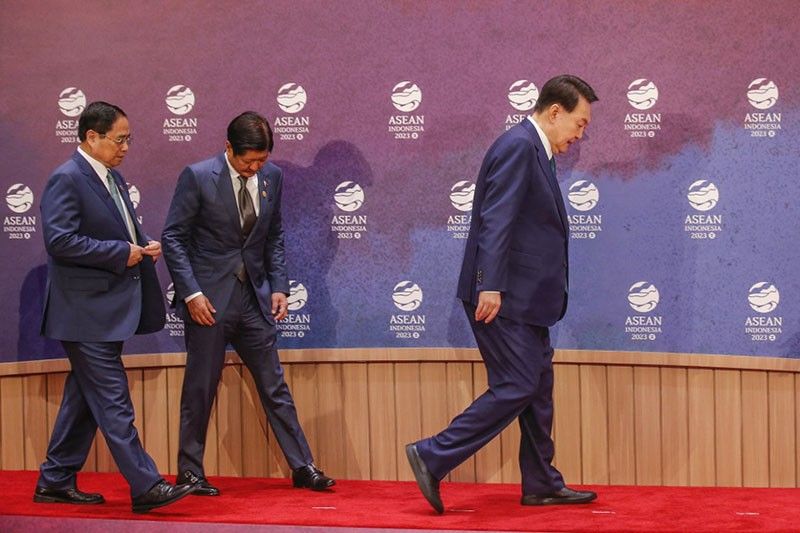Philippines and Republic of Korea: A stronger partnership in Indo-Pacific

During the recently concluded 43rd Summit of the Association of Southeast Asian Nations (ASEAN), diplomats, analysts, and the media focused on President Ferdinand “Bongbong” Marcos Jr.'s intervention when he called on the regional organization to assert its centrality and universal multilateralism against (China’s) unilateral and assertive activities in the South China Sea.
The president also pushed for key advocacies in ASEAN, such as food and energy security, the potential of creative and digital economies, and medium-scale business enterprises, as well as addressing the adverse externalities of climate change. He met several heads of state in several bilateral meetings with ASEAN leaders and its dialogue partners.
Marcos met the Republic of Korea (ROK) President Yoon Suk Yeol and discussed new areas of cooperation, as well as to thank Seoul for its generous assistance to the victims of Typhoon Egay. The two countries have strengthened their long partnership by signing a free trade agreement.
The Philippines and South Korea have a long history forged in blood. Diplomatic relations between Manila and Seoul were established on March 3, 1949, when the Philippines became the fifth state to recognize the Republic of Korea. The strength of this relationship was tested during the Korean War when Manila deployed the Philippine Expeditionary Forces as part of the US-led United Nations (UN) forces that defended the Republic of Korea against the aggression of communist North Korea.
As bilateral relations evolved from the 1950s to the first decade of the 21st century, the Philippines’ strong and deep ties with South Korea are reflected in the areas of economics, development, and more significantly, defense. Philippine-South Korean cooperation extends to all sectors, including political security, the economy, socio-cultural development, and people-to-people relationships.
South Korea’s military assistance towards the Armed Forces of the Philippines include territorial defense capacity-building efforts. This makes South Korea a significant defense and security partner for the Philippines. The Philippine Air Force has acquired a squadron of FA-50 Golden Eagles, and three guided missiles from the ROK.
In November 2019, the Philippine Department of National Defense and the ROK’s arms procurement agency, the Defense Acquisition Program Administration (DAPA), signed a Memorandum of Understanding (MOU) on Defense Cooperation to streamline Manila’s acquisition of defense materials from Korean companies.
For the Philippines, the MOU will support the AFP’s modernization by focusing on big-ticket items like frigates, corvettes, anti-ship missiles, and even possibly submarines, rather than assault rifles and machine guns. These developments indicate that the two countries’ relations have gone beyond regular commercial or trade transactions.
Instead, their relations have become a quintessential security partnership that is just below the level of a formal treaty alliance. The two countries also saw an essential convergence in their respective economic interests that paved the way towards their decision to sign an FTA.
Before he departed for the 43rd ASEAN summit in Jakarta, Marcos announced that he would push for a rules-based international order to prevent tensions in the South China Sea from spiraling into an armed conflict. He stated the Philippines’ concern over consistent actions that violate obligations under international law, including the 1982 United Nations Conventions of the Law of the Sea (UNCLOS) and the ASEAN-China Declaration on the Conduct of Parties in the South China Sea (DOC).
Marcos also raised the issue of the dangerous use of Coast Guard and maritime militia vessels, as well as the illegal, unreported, and unregulated fishing and militarization of reclaimed features in the South China Sea. He declared that the Philippines would continue supporting the freedom of navigation, overflight, and the rules-based international order in the South China Sea.
Yoon urged the ASEAN states to align their interest with the three-way security partnership of South Korea, the United States and Japan. He highlighted the trilateral security partnership’s importance in the face of China’s expansion in the South China Sea and its strategic support for ASEAN in terms of the annual trilateral Indo-Pacific dialogue and the launching of the Trilateral Maritime Security Cooperation Framework, aiming to support the maritime security capabilities of Southeast Asian and Pacific Island nations.
During the ROK-ASEAN summit, Yoon and his ASEAN counterparts adopted a joint statement on the ASEAN Outlook on the Indo-Pacific as he noted the landscape for security cooperation between the ROK and ASEAN has expanded after Seoul adopted its new regional strategy called the Korea-ASEAN Solidarity Initiative (KASI) in 2022.
Unlike the ROK’s previous policy toward ASEAN policies, which focused mainly on the ROK’s mercantile interests, KASI offers new initiatives that seek strategic coordination with the ASEAN member states in areas of national security and defense. President Yoon proposed expanding collaboration in the defense industry through consultations between national defense authorities and regional maritime security.
For his part, Marcos acknowledged the ROK’s implementation of the KASI, which he hoped would further depend on ASEAN-ROK cooperation on common concerns. He also welcomed the enhancement of the ASEAN-ROK comprehensive security cooperation. Furthermore, he highlighted the Philippines’ appreciation and support for the U.S., ROK and Japan trilateral security partnership that has sustained the rules-based international system and stability in the Indo-Pacific region.
The convergence of the Philippines and ROK’s Indo-Pacific interests, along with the two countries signing of an FTA on the side of the ASEAN summit, marks a dramatic transformation of the two countries’ long-standing security partnership. This is a development that is a welcome development amidst the ongoing geopolitical dynamics in the Indo-Pacific.
Renato Cruz De Castro is trustee and program convenor of think tank Stratbase Institute.
- Latest





























